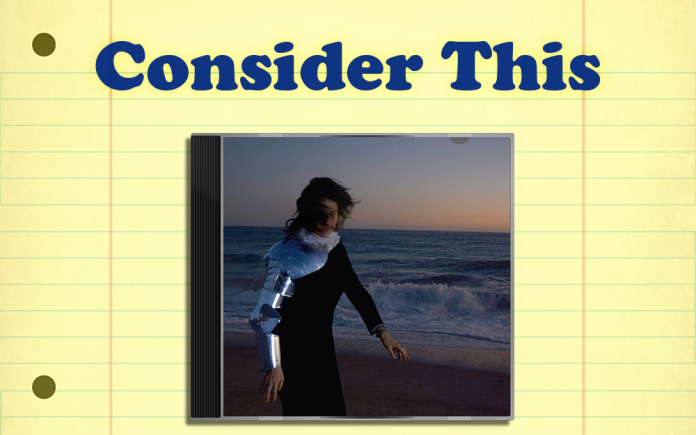
By Eleni P. Austin
“If I stopI get stuck, If I’m stuck, I’m not still, thrown into reverse, down the hill, I get stuck in the honey of a memory,I get stuck in the blues of a dream.”
That’s Sarabeth Tucek (who has recently adopted the more efficient acronym, SBT), parsing the ebb and flow of emotional equilibrium on “Happiness,” a track off her newest long-player, Joan Of All. Sarabeth doesn’t make records very often but when she does, to paraphrase a pithy catch-phrase from the late-great Ricky Nelson, she don’t mess around, boy.
Sarabeth was born in Miami, raised in Manhattan and spent her adolescence in Westfield, New Jersey. A child of divorce, she grew up listening to Cat Stevens, Woody Guthrie and Bruce Springsteen with her mother. Her father was a Classical music aficionado who also introduced Sarabeth and her sister to the dense and intricate pleasures of artists like Laurie Anderson and Steve Reich. It was her dad that taught her how to really listen to music and appreciate the subtle nuances. She arrived in L.A. at the turn of the 21st century, set on an acting career. It was her friendship with Brian Jonestown Massacre architect, Anton Newcombe that inspired her to pick up a guitar and start writing songs. Soon enough, she was adding backing vocals to Supper, the 10th album from critical darling Smog (a.k.a. Bill Callahan). Her self-titled debut, produced by Ethan Johns and Luther Russell, arrived in 2007. The cognoscenti characterized her songs as “somber, solemn, spartan and spooky confessionals.” She shared stages with well-respected artists like Ray Lamontagne and Black Rebel Motorcycle Club. Even Bob Dylan was smitten with her sound. He ended up inviting her on tour as his opening act.
2011 saw the release of her sophomore effort, Get Well Soon, which was also produced by Luther Russell. Heavily influenced by the death of her father, the record was equal parts beautiful and haunting. A mordant meditation on grief, it brought a measure of catharsis even as it remained visceral and uncompromising.
Now, nearly a dozen years later, she has returned with Joan Of All, a sweeping 15-song set that deals a surfeit of complicated emotions. The first few songs set the scene, matching a disparate array of melodic colors and textures to introspective lyrics and moodily elegant vocals.
The ambient noise of crashing waves is immediately superseded by acoustic strumming and Sarabeth’s tremulous vocals on the opener, “Joan Says.” Lyrics like “There was a picture Joan gave to me, she said she thought I should now keep, she said it is the way I wish you could have always stayed, fearless and full of love” land somewhere between a haiku and a pentimento, before the song cleverly folds into the flickering guitar and thunderous rhythms of “Amber Shade.”
Stripped-down guitars, tensile bass and a rumbling beat shadow her casual and conversational vocals. When a mansplain-y dude named Adam wants her to ditch a treasured, but fragile tchotchke, she quietly dismisses his faux concern, insisting; “It’s just what you do, it’s just what you do when you love something and you want it to last, especially if it’s fragile and made of glass/I’m afraid, but what should I do, everything breaks, should I just say fuck it to everything and walk away….” Serpentine guitars sidewind through a protean arrangement that straddles the line between tough-minded Garage Rock and flinty Post Punk. By the end, the track downshifts into a shimmery outro that feels like a cosmic exhale. “The Living Room” executes a stylistic 180 and sticks the landing. The pastoral melody is accented by braided guitars that envelop whispery keys and thready bass across a hiccough-y ¾ beat. She attempts to take an emotional inventory; “I put my life in the center of the room, I dim the lights on parts of the truth, I spin it around and around, past the parts that are wearing down.” Firefly keys flutter on the break, as twinkly guitars oscillate slowly. Expectations are downsized, but an epiphany emerges; “go back home, try to love what you can.”
Then there’s the crushed velvet allure of “Cathy Says.” Fleet fretwork wraps around loose-limbed bass, slinky keys, a rattletrap beat and Sarabeth’s trilling vocals. Tumbling down a rabbit-hole of regret, lyrics wonder about “the road I chose, and if it was the right road, and will I ever know, will I ever know?” Phased guitars and ticklish hi-hat accompany the final notes of equivocation.
Sarabeth has a knack for pulling the listener close. With “Something/Anything,” see-saw guitars are held in check by downcast bass lines. She tenderly addresses an ex; “my heart beat along with your breath, and later you cried in your sleep, it was then that I fell deep.” Despite the Todd Rundgren-esque title, the jittery arrangement and bare-bones instrumentation splits the difference between gritty Garage Rock and the Power Pop fever dream of Big Star’s Third/Sister Lovers.
Then there’s the spectral “Swings,” which blends swoony guitar and tinkling windchime percussion. While there is a tart specificity to her childhood memory, it also seems wildly universal; like maybe you night have seen it on an ABC Afterschool Special episode; “Once upon a time there was a lady who lived close by and when I was young, she took me to the park, she put me on a swing and pushed me toward the sky, she pushed me too high, I felt like I would die, she told me to touch the sky. A soaring keys coda ushers the song to a close.
On the aforementioned “Happiness,” delicate acoustic arpeggios wash over hushed keys, knotty bass lines and sparkly percussion, nearly camouflaging the soul-search triggered by an oddly intrusive question. On the break, time signatures shift and the arrangement locks into a Prog-Rock groove as shivery guitars and Wurlitzer-y keys intertwine atop a propulsive beat. Sarabeth launches into a nearly inaudible monologue before issuing a simple request; “Next time you see out me at a party, don’t ask me if I’m happy, you break the spell, you knock me out of myself.”
Rounding out this gauzy quadriptych is “Sheep,” which opens tentatively with churchy organ and rangy guitars before hairpin turning through a series of aural switchbacks. Bendy, Psychedelic guitar notes ping and tremble, tethered to a hi-hat kick, and the song shapeshifts yet again, as sludgy guitars collide with sinewy bass and a walloping beat. Lovelorn lyrics conjure a vivid tableau; “The dream of tumbling sheep, black and white, thrown like dice from the sky, from the sky, they land, they stand in pairs or alone, stunned into stillness, but free to roam.” Desolate backwards vocals and guitar chords steer the song to an ambivalent close.
The album’s centerpiece, “13th St.,” channels author Thomas Wolfe and Punk Rock pioneer/provocateur Lou Reed. Clocking in at under just under minutes, slashing rhythm guitar chords partner with vinegary electric riffs, prowling bass lines and a thunking beat. Her mien is almost phlegmatic as she unspools a series of vignettes that happened at her dad’s place; “Down on 13th St., on New Year’s Eve, we’d get bundled up, wait out on the stoop for midnight to come/And then we’d run up and down the street, yelling “Happy New Year,” then Dad would let us have some champagne the next day…and we didn’t even know that we were happy.” Decades later, following her father’s death she returns, and much like Thomas Wolfe predicted, you can’t go home again; “Then came a day, I was visiting New York from L.A., wanted to feel my roots, go sit on my old front stoop, and I couldn’t believe my eyes, and I started to cry/It was gone, the whole Brownstone, and the neighbors too, put up a mansion…. So, I called my mother, and she said ‘Sara, what can you do? Everything you say hello to, you have to say goodbye to, too.’” Her deadpan demeanor nearly disguises the homesick ache. As the cyclonic instrumentation swirls toward a dissonant crescendo she retreats into a record. The angst briefly recedes as her worn, vinyl copy of Coney Island Baby takes up residence on her turntable, and she remains still and just listens.
The album’s final three tracks form a melancholy triumvirate. “The Tunnel” is swaying dirge that blends ethereal vocals, authoritative piano notes, shang-a-lang guitars and thrumming bass. The narrative shifts from calming a thunder-phobic dog to navigating a mental health crisis in a Mexican hospital. A chunky drum beat and coruscated piano runs wrap around a restless denouement; “Now me and the dog in a nighttime fog hold each other tight, wild-eyed, and pray for the end of this stormy night.”
Initially, “Unmade/The Dog” offers a cautious celebration for a lazy day. Muted drums connect with discreet keys and loping guitars as she unfurls a quiescent day where “the only thing blue was the sky over you.” The beat kicks over and vroom-y electric chords and sugar rush acoustic notes lighten the mood. Lyrics, inspired by Irish writer Samuel Beckett allude to further dog-centric adventures, but are easily supplanted by gorgeous, sun-dappled guitars.
The record winds down with “Creatures Of The Night.” Lilting piano notes, rippling acoustic guitar and drifty keys cradle Sarabeth’s impish vocals. She seems to be banishing her demons; “Creature of the night, we should leave each other’s side, it’s too late to get into it, but I’m just not built for this anymore.” It’s a buoyant finish to a watershed record.
As with her first two releases, Joan Of All was produced Luther Russell. While Sarabeth sang and played guitar, Luther tackled drums, guitar, bass, keys and percussion. Jason Hiller was on bass and additional keys and vocals were handled by Chris Joyner and Maesa Pullman, respectively.
This record will easily summon comparisons to antecedents like Sybille Green, The Velvet Underground and Patti Smith, along with contemporaries like Mazzy Star and Laura Marling. But this is pure Sarabeth. It’s truly ironic that she truncated her name to SBT only to release her most expansive, fully-realized album to date. It’s a dazzling achievement, that feels like a snapshot, capturing a moment that was here before it was gone.












































